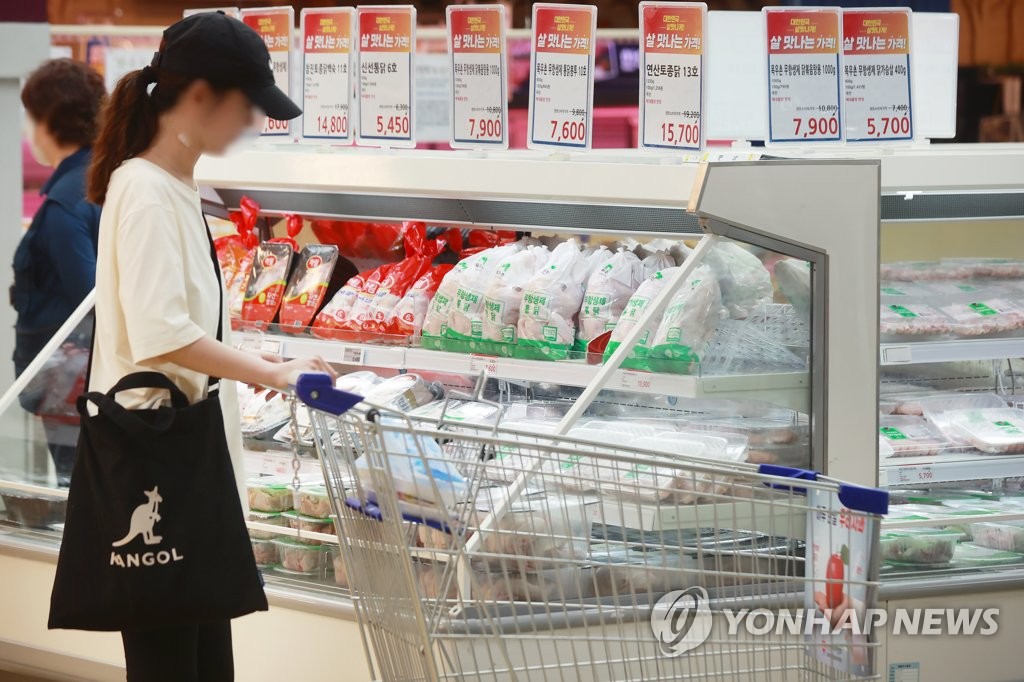- California Assembly OKs highest minimum wage in nation
- S. Korea unveils first graphic cigarette warnings
- US joins with South Korea, Japan in bid to deter North Korea
- LPGA golfer Chun In-gee finally back in action
- S. Korea won’t be top seed in final World Cup qualification round
- US men’s soccer misses 2nd straight Olympics
- US back on track in qualifying with 4-0 win over Guatemala
- High-intensity workout injuries spawn cottage industry
- CDC expands range of Zika mosquitoes into parts of Northeast
- Who knew? ‘The Walking Dead’ is helping families connect
S. Korea’s consumer prices slow for 4th month in May
South Korea’s consumer prices growth slowed for the fourth consecutive month in May from a year ago, data showed Friday, in yet another signal that the country’s inflation has passed its peak.
Consumer prices, a key gauge of inflation, rose 3.3 percent last month from a year earlier, compared with a 3.7 percent on-year rise in April, according to the report from Statistics Korea.
The growth fell below 4 percent for the first time in 14 months in April. The latest figure also marked the lowest level since the 3.2-percent growth tallied in October 2021.
South Korea’s inflation has been on a downward trend with some ups and downs after reaching a peak of 6.3 percent in July last year.

The prices of utility services shot up 23.2 percent on-year in May amid the prolonged jitters in the global energy supply amid the Russia-Ukraine war, which induced the state-run Korea Electric Power Corp. to raise rates. South Korea depends heavily on imports for its energy needs.
The prices of agricultural, fisheries and livestock products, on the other hand, slightly decreased by 0.3 percent, due to the stabilized costs of pork and beef products, although the price tags on chicken and mackerel moved up.
Industrial product prices increased 1.8 percent on-year, led by higher costs for bread and children’s clothes. Those of diesel and gasoline, on the other hand, fell 24 percent and 16.5 percent, respectively.
Prices of services increased 3.7 percent on-year, due to higher insurance and housing management costs.
Core inflation, which excludes volatile food and energy prices, rose 3.9 percent on-year in May, compared with a 4 percent rise tallied a month earlier.
“Although core inflation had previously exhibited limited decline, it demonstrated a slight fall in May,” an official from the agency said, noting the prices of fuel and agricultural products have lost ground.
Prices of daily necessities — 144 items closely related to people’s everyday lives, such as food, clothing and housing — climbed 3.2 percent on-year last month, slightly slowing from 3.7 percent tallied in April.
Last week, the Bank of Korea held the benchmark interest rate steady for the third straight time at 3.5 percent on easing inflationary pressure amid rising concerns over an economic slowdown.
Inflation stayed above 2 percent — the central bank’s inflation target over the medium term — for the 26th straight month in May.
In a separate report, the finance ministry said it was notable that South Korea was among seven countries in the Organization for Economic Cooperation and Development to post an inflation at the 3 percent level or below.
The government will continue to take watchful eyes on prices of major items amid global uncertainties, it added.
“With the global prices of raw materials showing signs of stabilization, the costs of foodstuffs and personal services, which had showed a sharp hike earlier this year, also have eased,” First Vice Finance Minister Bang Ki-sun also said during a meeting with other vice ministers.
“Nevertheless, in light of the volatility of global raw material prices and the chances of abnormal climate conditions during the summer, the government remains committed to its policy objective of price stabilization,” Bang added.
The ministry said earlier this week that South Korea will apply tariff-rate quotas on eight major foodstuff imports, including pork and mackerel, starting this month to ease households’ burden amid rising consumer prices.












